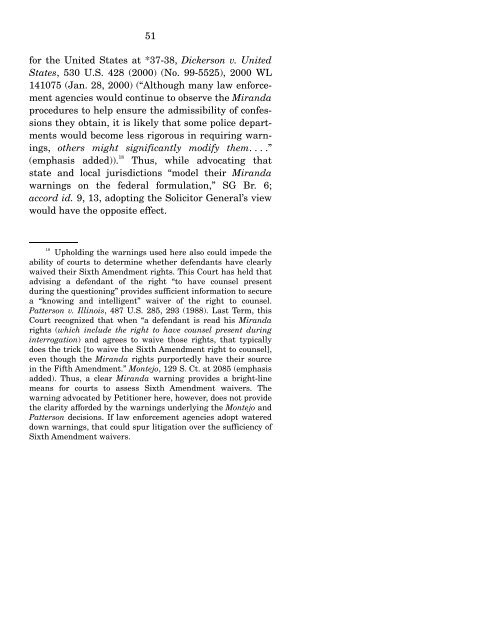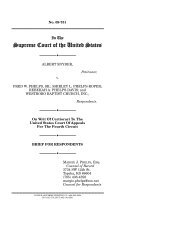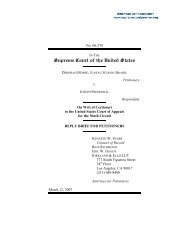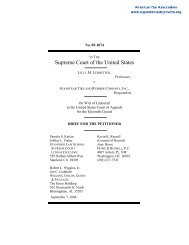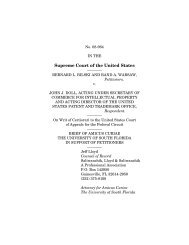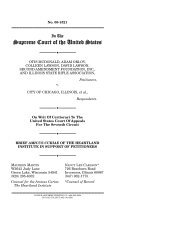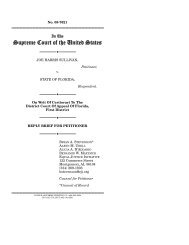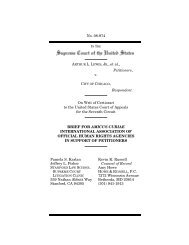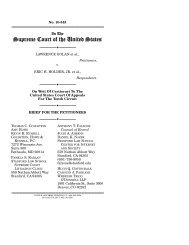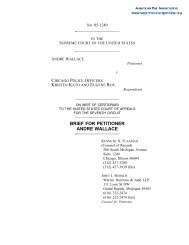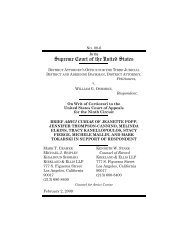Brief of respondent for Florida v. Powell, 08-1175 - Oyez
Brief of respondent for Florida v. Powell, 08-1175 - Oyez
Brief of respondent for Florida v. Powell, 08-1175 - Oyez
You also want an ePaper? Increase the reach of your titles
YUMPU automatically turns print PDFs into web optimized ePapers that Google loves.
51<br />
<strong>for</strong> the United States at *37-38, Dickerson v. United<br />
States, 530 U.S. 428 (2000) (No. 99-5525), 2000 WL<br />
141075 (Jan. 28, 2000) (“Although many law en<strong>for</strong>cement<br />
agencies would continue to observe the Miranda<br />
procedures to help ensure the admissibility <strong>of</strong> confessions<br />
they obtain, it is likely that some police departments<br />
would become less rigorous in requiring warnings,<br />
others might significantly modify them. . . .”<br />
(emphasis added)). 18<br />
Thus, while advocating that<br />
state and local jurisdictions “model their Miranda<br />
warnings on the federal <strong>for</strong>mulation,” SG Br. 6;<br />
accord id. 9, 13, adopting the Solicitor General’s view<br />
would have the opposite effect.<br />
18<br />
Upholding the warnings used here also could impede the<br />
ability <strong>of</strong> courts to determine whether defendants have clearly<br />
waived their Sixth Amendment rights. This Court has held that<br />
advising a defendant <strong>of</strong> the right “to have counsel present<br />
during the questioning” provides sufficient in<strong>for</strong>mation to secure<br />
a “knowing and intelligent” waiver <strong>of</strong> the right to counsel.<br />
Patterson v. Illinois, 487 U.S. 285, 293 (1988). Last Term, this<br />
Court recognized that when “a defendant is read his Miranda<br />
rights (which include the right to have counsel present during<br />
interrogation) and agrees to waive those rights, that typically<br />
does the trick [to waive the Sixth Amendment right to counsel],<br />
even though the Miranda rights purportedly have their source<br />
in the Fifth Amendment.” Montejo, 129 S. Ct. at 2<strong>08</strong>5 (emphasis<br />
added). Thus, a clear Miranda warning provides a bright-line<br />
means <strong>for</strong> courts to assess Sixth Amendment waivers. The<br />
warning advocated by Petitioner here, however, does not provide<br />
the clarity af<strong>for</strong>ded by the warnings underlying the Montejo and<br />
Patterson decisions. If law en<strong>for</strong>cement agencies adopt watered<br />
down warnings, that could spur litigation over the sufficiency <strong>of</strong><br />
Sixth Amendment waivers.


